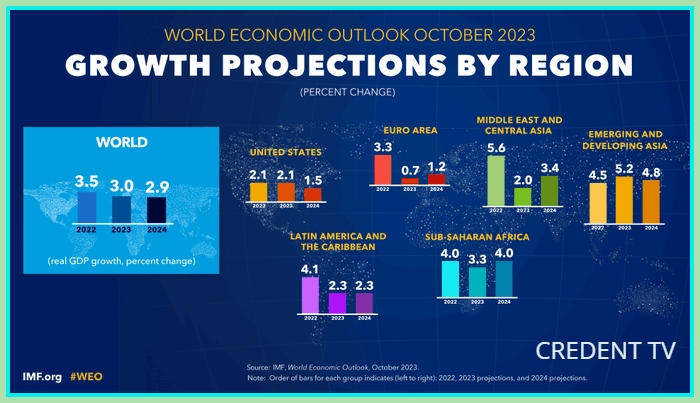BANK
The IMF predicts that global growth would slow to 2.9% in 2024
Published
8 months agoon

According to the International Monetary Fund, global growth will remain at 3% in 2023, before falling to 2.9 percent in 2024. This is one of the slowest rates of growth in decades
The most current economic forecasts from the International Monetary Fund (IMF) show that global growth would likely stay at 3 percent in 2023 and then drop to 2.9 percent in 2024, which would be among the lowest growth rates in decades. In its October 2023 report titled “Navigating Global Divergences,” the IMF lists the major obstacles the world economy must overcome as well as the main causes of this gloomy picture.
Global Growth Estimates
Growth Declining: According to the IMF’s base case, global growth would decrease from 3.5 percent in 2022 to 3 percent in 2023 and then to 2.9 percent in 2024. This trend is lower than the 3.8 percent historical average that was noted between 2000 and 2019.
Advanced Economies: Growth in advanced economies is predicted to slow down as well, falling from 2.6% in 2022 to 1.5% in 2023 and 1.4% in 2024. The tightening of policies intended to reduce inflation is blamed for this reduction.
Emerging Markets and Developing Economies: Growth in these areas is probably going to slow down a little bit, from 4.1 percent in 2022 to 4 percent in 2023 and 2024.
Anticipations for Inflation
Global Inflation: According to the estimate, there will be a gradual decline in global inflation from 8.7% in 2022 to 6.9% in 2023 and 5.8% in 2024. Lower global commodity prices and stricter monetary policy are factors contributing to this drop.
Core Inflation: In most situations, a return to target inflation is not anticipated until 2025. Core inflation, on the other hand, is predicted to decline more slowly. The IMF places a strong emphasis on the necessity of frameworks and monetary policy actions to stabilise inflation expectations as well as efficient communication tactics to control inflation expectations among diverse stakeholders.
Obstacles to the World Economic Recovery
Differences in Economic Recovery: The IMF report emphasises that although the world economy has demonstrated some resilience in previous phases of recovery, economic activity is still below pre-pandemic levels. This is particularly noticeable in developing and emerging market economies, where regional differences are growing.
Relentless Obstacles: A strong recovery is nevertheless hampered by a number of issues, such as the pandemic’s lingering effects, the situation in Ukraine, geoeconomic fragmentation, cyclical variables associated with tighter monetary policy, the removal of government support, and extreme weather.
Read also:-Nita Ambani is the recipient of the USISPF Global Leadership Award for Philanthropy and Corporate Social Responsibility
Risks to Global economy: There are still risks to global economy even though there is less chance of a harsh crash. Particular worries include the crisis in China’s real estate market and how it would affect commodity exporters, growing expectations for near-term inflation, tight labour markets pushing core inflation, and possible shocks to the geopolitical and climate systems.
Handling Difficulties and Hazards
Stress on Crucial Components: Effective policies, international cooperation, and structural reforms are emphasised by the IMF as critical components for overcoming these obstacles and achieving a strong and long-lasting global economic recovery.
Importance of International collaboration: In order to ensure a more stable and prosperous future, international collaboration and wise economic policies become increasingly important as the globe struggles with uncertainties and the possibility of greater disruptions.
You may like
-


North Korea asserts that the test of a multiple-warhead missile was successful
-


The Student Wing of Congress storms the Exam Body NTA office and locks it from within
-


“During President Murmu’s address to Parliament, PM Modi was shown 73 times, and LoP Rahul Gandhi was shown six times”: Congress
-


NASA contracts Elon Musk’s SpaceX to deorbit the International Space Station in 2023.
-


A Caution For The CBI In The Delhi Court’s Arvind Kejriwal Custody Order
-


Bar Council of India requests that bar associations abstain from demonstrating in opposition to new criminal laws
